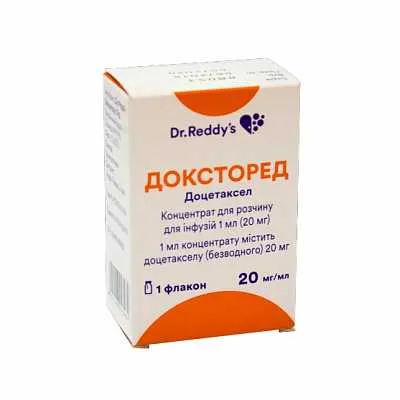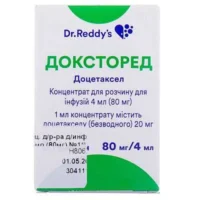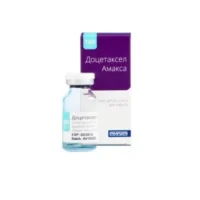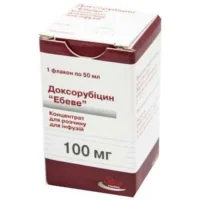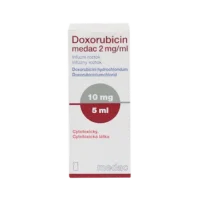Description
Doxtored (Docetaxel) Concentrated Solution for Infusions 20 mg/ml. 1ml. (20 mg.) Vial №1
Ingredients:
Each vial contains 20 mg of docetaxel in a concentrated solution for infusion.
Mechanism of Action:
Docetaxel, a taxane derivative, exerts its cytotoxic effects by promoting the assembly and stabilization of microtubules, leading to cell cycle arrest in the G2/M phase and subsequent apoptosis.
Pharmacological Properties:
Docetaxel demonstrates high lipophilicity and binds to cellular components, inhibiting the disassembly of microtubules critical for cell division. This unique mechanism contributes to its potent antineoplastic activity.
Indications for Use:
Doxtored is indicated for the treatment of various malignancies, including metastatic breast cancer, non-small cell lung cancer, hormone-refractory prostate cancer, gastric adenocarcinoma, and head and neck cancer.
Contraindications:
Doxtored is contraindicated in individuals with a known hypersensitivity to docetaxel or any other components of the formulation. Patients with severe hepatic impairment or pre-existing neutropenia should also avoid its use.
Side Effects:
Common adverse reactions associated with Doxtored therapy include myelosuppression manifesting as neutropenia, anemia, thrombocytopenia, as well as non-hematologic toxicities such as fatigue, peripheral edema, and mucositis.
Usage Instructions:
Doxtored should be administered intravenously under the supervision of healthcare professionals trained in the management of chemotherapy-induced toxicities. The dosage is individualized based on the patient’s body surface area and overall health status.
Benefits Compared to Analogues:
Doxtored offers superior efficacy and tolerability compared to other taxanes, with clinical studies demonstrating improved response rates and prolonged survival outcomes in various cancer types.
Suitable Patient Groups:
While Doxtored is generally well-tolerated across different age groups, caution is advised when treating elderly individuals due to potential age-related organ dysfunction. Pediatric patients may require dosage adjustments based on their weight and age.
Storage and Shelf Life:
- Storage: Doxtored vials should be stored in a cool, dry place at controlled room temperature. Protect from light exposure.
- Shelf Life: The shelf life of Doxtored is typically two years from the date of manufacture when stored as recommended.
Packaging Description:
Doxtored is supplied in single-dose vials containing 20 mg of docetaxel in a sterile, clear solution suitable for intravenous infusion. Each vial is labeled with the product name, concentration, and volume for easy identification.

